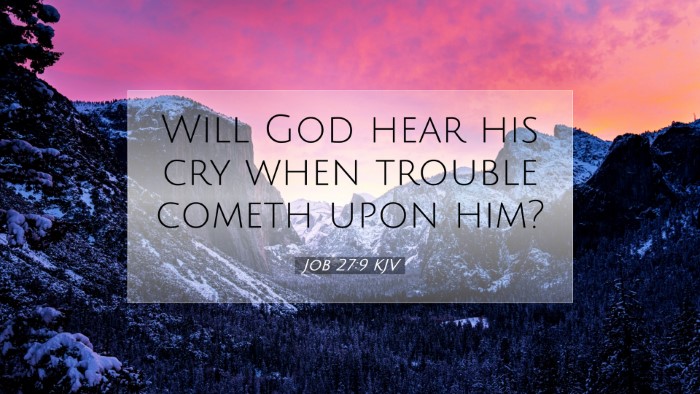Old Testament
Genesis Exodus Leviticus Numbers Deuteronomy Joshua Judges Ruth 1 Samuel 2 Samuel 1 Kings 2 Kings 1 Chronicles 2 Chronicles Ezra Nehemiah Esther Job Psalms Proverbs Ecclesiastes Song of Solomon Isaiah Jeremiah Lamentations Ezekiel Daniel Hosea Joel Amos Obadiah Jonah Micah Nahum Habakkuk Zephaniah Haggai Zechariah MalachiJob 27:9
Job 27:9 KJV
Will God hear his cry when trouble cometh upon him?
Job 27:9 Bible Commentary
Commentary on Job 27:9
The verse Job 27:9 states: "Will God hear his cry when trouble comes upon him?" This verse encapsulates a profound question regarding the nature of divine justice and the relationship between human suffering and divine responsiveness. It serves as a pivotal point in the discourse as Job continues to defend his integrity in the face of immense suffering and to articulate his understanding of God.
Contextual Background
The Book of Job addresses the theme of unjust suffering and the quest for understanding the reasons behind suffering. Job, a man of great righteousness, experiences profound loss and physical affliction. His friends offer traditional views of retributive justice, suggesting that suffering is a direct consequence of sin. In contrast, Job struggles with this notion, asserting his innocence and raising questions about God’s justice.
Exegesis of Job 27:9
In this verse, Job poses a rhetorical question that reflects his despair and disappointment with the perception of God. Commentators provide a depth of insight into this line of inquiry.
- Matthew Henry's Commentary: Henry asserts that Job is emphasizing the idea that if God were to be indifferent to the cries of those in distress, it would challenge the very essence of divine justice. Job fears that when calamity strikes, God does not draw near to assist the righteous who are suffering. Henry emphasizes the importance of recognizing God’s presence in times of trouble, suggesting that silence from God can be as distressing as the suffering itself.
- Albert Barnes' Notes: Barnes points out that Job’s inquiry reveals a deep theological dilemma: the apparent silence of God during human adversity. He reflects on the nature of supplication and whether God is always attentive to human plight. Barnes underlines the necessity for believers to maintain faith, even when their condition tempts them to doubt God's justice or concern.
- Adam Clarke's Commentary: Clarke delves into the implications of Job’s question, reminding readers that the persistence of faith under hardship is a theme throughout Scripture. He emphasizes that Job's assertion reflects a longing for divine intervention during moments of suffering. Clarke further explains that such questions mirror the human condition, where individuals often feel abandoned during their trials.
Theological Implications
Job’s question opens up a broad theological discussion regarding:
- Divine Justice and Human Suffering: The tension between divine justice and human suffering is a critical theme in Job. Many theologians suggest that understanding God’s purposes during suffering requires faith in His ultimate plan.
- The Nature of God’s Response: Job’s question implies a belief that God should respond to cries for help. The silence of God during suffering raises important inquiries about the nature of divine intervention and the human experience of pain.
- The Role of Faith: The narrative of Job encourages believers to cultivate a deep-seated faith that transcends circumstances. The question posed by Job serves as a catalyst for reflecting on persevering faith amid despair.
- Community and Suffering: This verse also invites consideration of how believers respond to one another in times of distress. The communal aspect of faith is essential, as friends and family often bear witness to each other’s suffering and need to demonstrate God’s love through presence and support.
Application for Believers
Pastors, students, and theologians can draw valuable lessons from Job 27:9. The following applications are essential:
- Encouraging Authentic Prayer: Believers are encouraged to approach God with honesty in prayer, expressing doubts and fears in the face of suffering. Job models this authentic dialogue with God.
- Praying for Others: Understanding the distress of others, believers are reminded to intercede on behalf of those who seem abandoned or who are suffering deeply, assuring them of God's presence.
- Hope in God’s Justice: The verse encourages believers to find comfort in the hope that God is just and that He listens to the cries of His people, even when circumstances suggest otherwise.
Conclusion
Job 27:9 continues to resonate with individuals grappling with the complexities of faith amidst suffering. By combining insights from various public domain commentaries, we are reminded of the importance of maintaining faith, fervently seeking God in times of trouble, and understanding the depth of divine justice. This verse, while a cry of despair, also serves as a profound affirmation of the human desire for connection with God—a desire that continues to echo throughout the ages.


